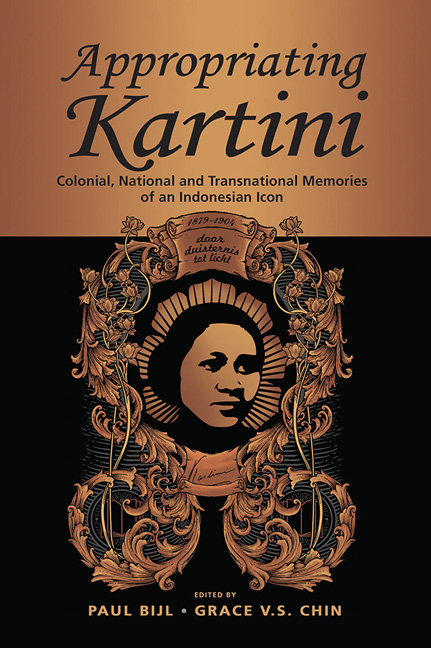Book contents
- Frontmatter
- Contents
- Acknowledgments
- The Contributors
- 1 Introduction
- 2 Crafting Reform: Kartini and the Imperial Imagination, 1898–1911
- 3 Hierarchies of Humanity: Kartini in America and at UNESCO
- 4 Ambivalent Narration: Kartini’s Silence and the Other Woman
- 5 Unpacking a National Heroine: Two Kartinis and Their People 103
- 6 Call me Kartini? Kartini as a Floating Signifier in Indonesian History
- 7 Kartini and the Politics of European Multiculturalism
- 8 Afterword
- Index
1 - Introduction
Published online by Cambridge University Press: 02 April 2020
- Frontmatter
- Contents
- Acknowledgments
- The Contributors
- 1 Introduction
- 2 Crafting Reform: Kartini and the Imperial Imagination, 1898–1911
- 3 Hierarchies of Humanity: Kartini in America and at UNESCO
- 4 Ambivalent Narration: Kartini’s Silence and the Other Woman
- 5 Unpacking a National Heroine: Two Kartinis and Their People 103
- 6 Call me Kartini? Kartini as a Floating Signifier in Indonesian History
- 7 Kartini and the Politics of European Multiculturalism
- 8 Afterword
- Index
Summary
This volume offers the first book-length study of the circulation and appropriation of Raden Ajeng Kartini (1879–1904, henceforth Kartini), a young Javanese woman whose influential writings emerged during the colonial Dutch East Indies, and who is now recognized as an iconic feminist and nationalist figure in Indonesia and, after Anne Frank, the most well-known Dutch-language author in the world. Spanning across the twentieth and early twenty-first centuries in both Asian and Western contexts, this volume maps and interprets how varying state, social and cultural actors and institutions have appropriated her thoughts to articulate their views on the position of women, race, class, civil rights, nationalism and other subjects in (post)colonial and global Indonesia, Europe and North America.
The world has known Kartini since the publication of a selection of her famous letters in 1911 titled Door duisternis tot licht (Through darkness into light) (Kartini 1911). Before that, she was mainly known in Dutch colonial circles, as can be glimpsed from almost one hundred newspaper articles during her lifetime and in response to her death in 1904.1 Since 1911, she has been translated into numerous languages, including Arabic, Sundanese, Javanese, Japanese, Russian and French, but most influentially into English as Letters of a Javanese Princess in 1920 (Kartini 1920) and into Indonesian as Habis gelap terbitlah terang (When darkness ends, light appears) for the first time in 1922 (Kartini 1922, 1938). Between 1911 and Indonesian independence in 1945, Indonesian and Dutch newspapers devoted thousands of articles to her and to the “Kartini schools” named after her. Since then, hundreds of books, theses and scholarly articles analysing her life and letters have been produced (Delpher). In the 1960s, she was taken up by the UNESCO Collection of Representative Works, with a foreword for the English edition by Eleanor Roosevelt and by Orientalist Louis Massignon for the French edition (Kartini 1960, 1964; see also Bijl in this volume, Chapter 3). In Indonesia, President Sukarno established Kartini's birthdate, 21 April, as Kartini Day (Hari Kartini) in 1946 and made her a national hero in 1964, while under the New Order of President Suharto, Kartini Day was transformed into an annual event that is still celebrated across the archipelago (Sears 1996; Rutherford's Chapter 5 in this volume; Robinson's Chapter 6 in this volume).
Information
- Type
- Chapter
- Information
- Appropriating KartiniColonial, National and Transnational Memories of an Indonesian Icon, pp. 1 - 16Publisher: ISEAS–Yusof Ishak InstitutePrint publication year: 2020
